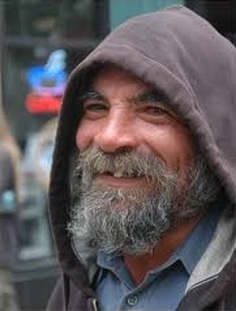 This is not Myron (I didn’t get a picture of him);
This is not Myron (I didn’t get a picture of him);Myron’s smile is even more beautiful.
Myron
Yesterday before the 4:30 Mass I was contentedly doing my prayers in front of the tabernacle when I heard someone talking out loud in the back of the church. It was a homeless man, and I gave thanks that homeless men feel welcome in our church, even though he was irritating me. On the steps after Mass two nice parishioners were welcoming me to the parish and out comes our homeless man. He was covered in filthy dreadlocks, dressed in stinking rags, and beaming the most radiant smile I’ve seen since Mother Teresa. Both parishioners knew him—“he’s been coming here for years,” they said—but neither knew his name. I went over to him to ask his name. “Myron,” he smiled. “That’s the name my mother gave me.” The name means sweet oil in Greek, as in “myrrh,” and I told him so. “That’s what my mother named me,” he repeated with a smile.
The stench of poverty
The man’s name was Myron, meaning “the anointed one,” the one who bears the fragrance of perfumed oil. The Hebrew for Myron is Mashiach, which became Christus in Greek. The Messiah Jesus Christ is the eternally Anointed One, bringing the fragrance of healing oil to the world. What about our San Francisco Myron? He is not sweet smelling. And yet his smile healed me. He is certainly an outcast, one of the city’s many street people, psychologically imbalanced, thrown away and forgotten. We see him every Sunday, we don’t know his name, and yet his name is an anointing.
The poor anoint us
Among the many truths contained in this famous parable of the Good Samaritan is that the poor anoint us; God saves us from ourselves through his beloved poor, if we take five minutes to acknowledge them. St. Vincent de Paul said that “those who love the poor in life will have nothing to fear in death, as I have seen on many occasions myself.” It is a poverty to ignore the poor, for they are Christ. But seeing God in the poor takes a persevering faith. It takes getting past the wall of stench that rolls off Myron’s neglected body. Mother Teresa once told a young volunteer to wash a dying man. He was almost stifled by a peculiar stench as he washed the man, but soon the smell became fresh and sweet. He described this phenomenon to Mother Teresa afterwards. “What you smelled at first was not his filth,” she told him, “but your own. In washing him, God was washing away your own selfishness, your own sin. That initial stench was you, not him, but God washed it away.”
I imagine the Good Samaritan got blood and sweat smeared on him, and perhaps even other bodily execrations, by hauling the helpless broken body of this man onto his own donkey. He let his life be disrupted, his plans changed. God needs to disrupt our lives at times, and he uses the poorest of the poor to do it. There is a kind of blessing, a grace and a joy, that comes only by surrendering to a poor man’s need. We can’t pick up the pieces of every broken person’s life, but if we never stop to help another man, we remain poor ourselves. Jesus’ last words to us in today’s Gospel are “Go and do likewise.” I’m sure you have, and if so, you’ve known the joy of loving Jesus in his distressing disguise of the poorest of the poor.
A Good Mother
How can we be consistent, however, in serving Christ in the poor? By imitating Our Blessed Mother, who took the broken, bloody, sweat-encrusted body of her son from the cross and held it in her arms. Holding tightly onto her hand, we can go to Calvary, like St. John. We can face poverty in others, and poverty in ourselves. The next time God asks you to help a poor person, or even talk to someone you don’t want to talk to, say a Hail Mary, and you will be able to do it.


 RSS Feed
RSS Feed